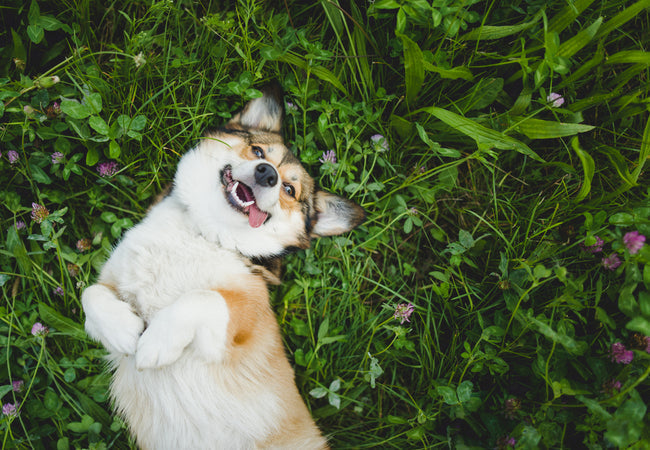2025 Vet Guide: Can Dogs Be Allergic to Grass? 🐕🌾

In this article
2025 Vet Guide: Can Dogs Be Allergic to Grass? 🐕🌾
By Dr. Duncan Houston BVSc
Grass allergies in dogs are more common than many pet parents realize. In this comprehensive guide, we'll explore how grass pollen or direct contact can spark itching, sniffles, and discomfort in our canine companions—and how to help them feel better, while keeping care practical and eco-conscious.
🌱 1. What Are Grass Allergies in Dogs?
Grass allergies in dogs are a form of environmental allergy, caused by either:
- Contact allergy: Direct skin exposure to grass triggers irritation.
- Inhalant allergy: Dogs inhale airborne grass pollen, often seasonal in spring/fall.
Symptoms typically surface at 6 months–3 years old and affect the skin, not the gut.
🔍 2. Signs & Symptoms to Watch For
Dogs with grass allergies often show:
- Constant itching, licking, rubbing—especially feet, belly, chest, face
- Red, inflamed skin ± rash, bumps, pustules, hair loss
- Recurrent skin or ear infections due to barrier damage
- Sneezing, runny eyes/nose—similar to human hay fever
- Hives or swelling in contact areas—ventral chest, thighs, limbs
👩⚕️ 3. Vet Diagnosis: Confirmation & Testing
Veterinary evaluation involves:
- Clinical history, seasonal pattern, physical exam
- Rule out fleas, mites, infections, and food allergy
- Allergy testing:
- Serum blood tests—for broad allergen panels
- Intradermal testing—most accurate method, performed with sedation
🛡️ 4. Treatment Strategies
Although grass allergies are not curable, they can be effectively managed through a multi-step approach:
4.1 Symptom Relief
- Prescription medications: Daily oral Zenrelia, injectable Cytopoint, short-term corticosteroids for flare-ups
- Antihistamines: Benadryl or vet-recommended, like Zyrtec, for mild signs, though efficacy is limited
4.2 Allergen Immunotherapy
Also known as desensitization therapy, dogs receive increasing doses of identified allergens (pollen or grass extracts).
- Subcutaneous immunotherapy (allergy shots) is common and effective long term
- Sublingual drops are emerging, though U.S. options are off-label
- Usually requires 6–12 months for benefit with lasting results
4.3 Skin Support & Hygiene
- Frequent baths with hypoallergenic or oatmeal shampoos to remove pollen—2×/week in high season
- Wipe paws, belly, and coat after outdoor exposure
- Apply medicated wipes/sprays with antibacterial/antifungal agents
4.4 Supplements & Diet
- Omega‑3/-6 fatty acids reduce skin inflammation
- Probiotics may support immune health and reduce reactions
- Novel-protein diets if food sensitivity is suspected
🌿 5. Environmental & Lifestyle Management
- Limit outdoor time during peak pollen (spring/fall) or on windy days
- Maintain short grass and clean outdoor areas
- Vacuum and wash bedding regularly to reduce indoor allergens
- Use HEPA air filters to clear airborne particles
🧩 6. Building a Personalized Care Plan
- Start with a vet assessment—history, exam, tests.
- Start symptom relief (Zenrelia, Cytopoint, antihistamines).
- Begin allergen immunotherapy if testing confirms grass allergy.
- Support with hygiene, baths, and wipes post-outdoor.
- Add omega-fatty acids, probiotics, or diet changes if needed.
- Monitor symptoms and re-evaluate regularly with vet or via Ask A Vet.
📚 7. FAQ
Q: Will bathing my dog too much dry their skin?
Use gentle, hypoallergenic, or oatmeal-based shampoos. In high pollen season, 2× weekly baths help without over-drying.
Q: How long before immunotherapy works?
Typically 6–12 months. Many dogs experience significantly less itching and chewing once built up.
Q: Can dogs have anaphylaxis from grass?
It’s rare—most dogs show skin symptoms, but facial swelling or breathing issues require immediate vet care.
Q: My dog rolls in grass a lot—is that an allergy sign?
Rolling may provide relief. If accompanied by itch, redness, or scratching, a grass allergy may be involved.
💬 8. Pet Parent Wisdom
From a Reddit thread:
> “I give him human Zyrtec daily… also bathe him once a week with anti‑bacterial shampoo… then seasonal shots only during high pollen.”
Combining antihistamines, bathing, and immunotherapy seasonally is a smart, balanced tactic.
🏁 9. Final Thoughts from Dr Houston
Grass allergies can be effectively managed with targeted medication, immunotherapy, skincare, and practical lifestyle changes. A tailored plan supported by reliable tools like Ask A Vet, Woopf, and Purrz ensures your dog’s comfort and well-being.
Ready to tackle grass allergy season confidently? Download the Ask A Vet app for personalized guidance, medication reminders, and access to caring veterinary support—wherever and whenever you need it. 📱🐶
Wishing you and your pup a calm, itch-free 2025!
AskAVet.com – Your partner in pet health. 📱






